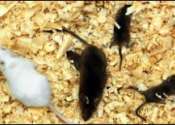Inhalable sensors could enable early lung cancer detection
Using a new technology developed at MIT, diagnosing lung cancer could become as easy as inhaling nanoparticle sensors and then taking a urine test that reveals whether a tumor is present.

Using a new technology developed at MIT, diagnosing lung cancer could become as easy as inhaling nanoparticle sensors and then taking a urine test that reveals whether a tumor is present.
Bio & Medicine
Jan 5, 2024
0
153

A team of researchers studying the Ngogo community of wild chimpanzees in western Uganda's Kibale National Park for two decades has published a report in Science showing that females in this population can experience menopause ...
Plants & Animals
Oct 26, 2023
0
162

Numerous studies have shown that trained dogs can detect many kinds of disease—including lung, breast, ovarian, bladder, and prostate cancers, and possibly COVID-19—simply through smell. In some cases, involving prostate ...
Analytical Chemistry
Feb 17, 2021
0
606

Headed to the bathroom? If you think you might have to "pee like a race horse," join the club - so does everyone else. Scientists who watched dozens of different mammals from rats to elephants relieve themselves found that ...
Plants & Animals
Jun 26, 2014
3
0

(Phys.org) —A small team of researchers at Tokyo University has found that giving dogs oxytocin causes them to display stronger bonding behavior, both with people and other dogs. In their paper published in Proceedings ...

(PhysOrg.com) -- Male capuchin monkeys have been observed to urinate on their hands and then rub the urine vigorously into their fur, and now a new study by scientists in Texas suggests the behavior signals their availability ...

(PhysOrg.com) -- New research has confirmed that mice have the biochemical pathways required to manufacture morphine from intermediates. Morphine is a powerful drug usually derived from the opium poppy, but scientists have ...

Cats communicate with others through their scents. One of their scent-marking behaviors is spraying urine on vertical surfaces such as walls and furniture. Although spraying plays an essential role in the feline world, it ...
Biochemistry
Apr 10, 2024
0
64

For many, spring heralds fresh air and exercise on the golf course. But do players risk exposure to unsafe levels of pesticides used to beautify and maintain a golf course's green grass?
Molecular & Computational biology
Apr 1, 2024
0
50

A paper-based platform developed by researchers at the Indian Institute of Science (IISc) and Jawaharlal Nehru Center for Advanced Scientific Research (JNCASR) could help quickly detect the presence of antibiotic-resistant, ...
Biochemistry
Feb 15, 2024
0
6
Urine is a liquid waste product of the body secreted by the kidneys by a process of filtration from blood called urination and excreted through the urethra. Cellular metabolism generates numerous waste compounds, many rich in nitrogen, that require elimination from the bloodstream. This waste is eventually expelled from the body in a process known as micturition, the primary method for excreting water-soluble chemicals from the body. These chemicals can be detected and analyzed by urinalysis. Amniotic fluid is closely related to urine, and can be analyzed by amniocentesis.
This text uses material from Wikipedia, licensed under CC BY-SA